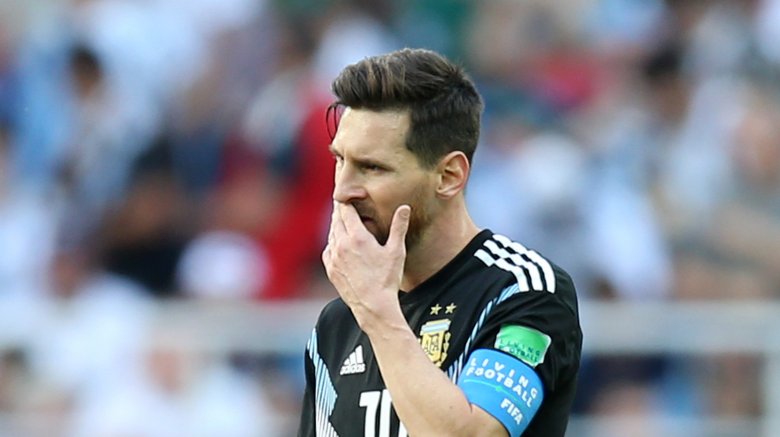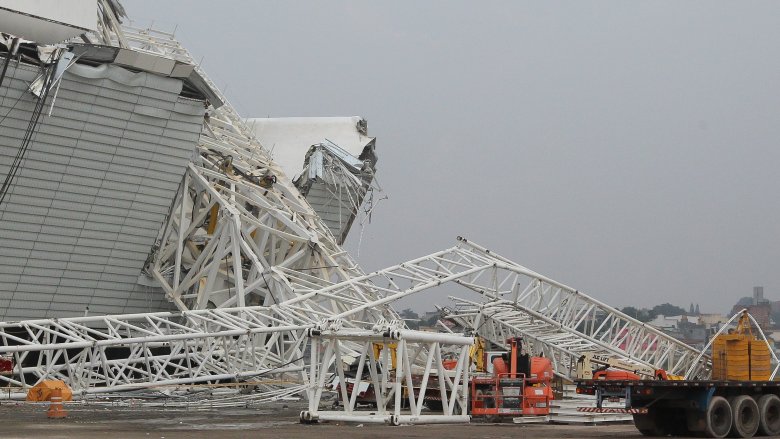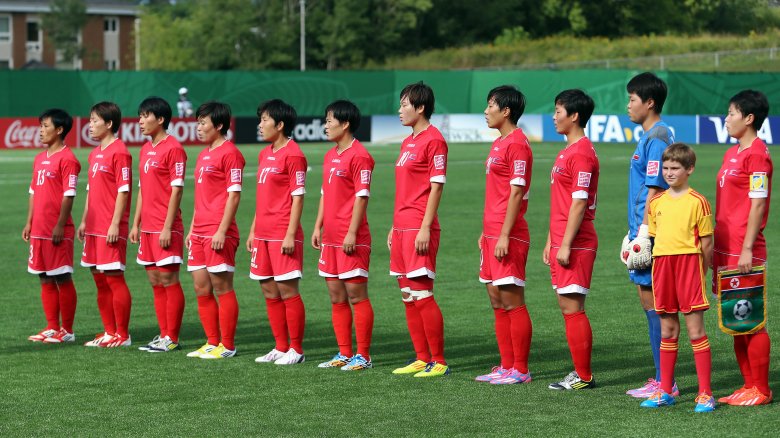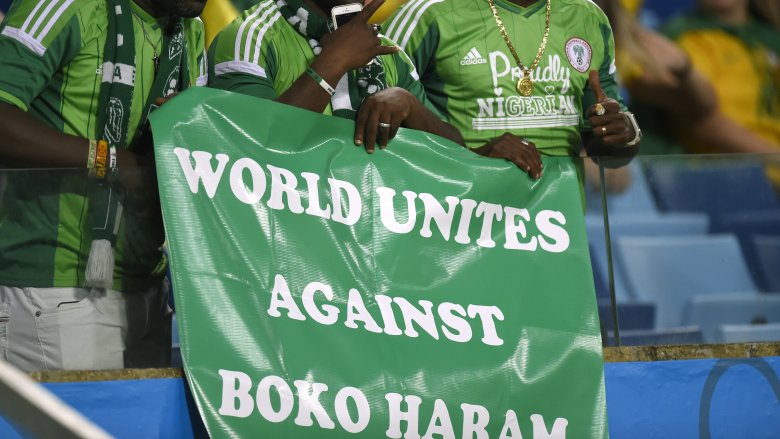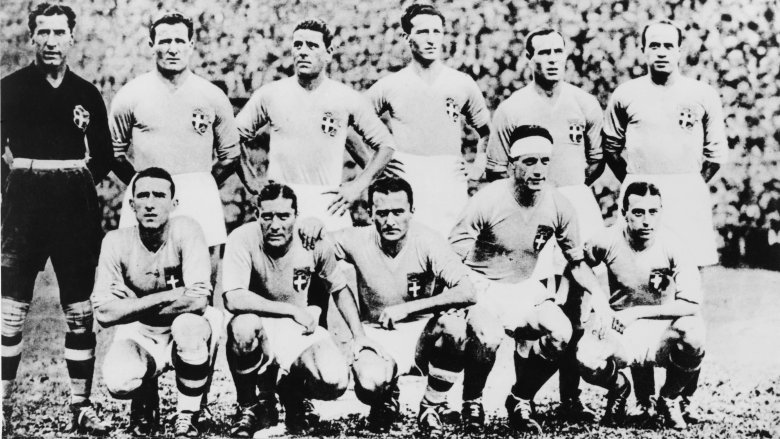The Most Frightening World Cup Mishaps
The World Cup is an almost impossibly huge undertaking. What other organization manages to bring together dozens of countries, balancing their egos and emerging as a force for good? Pretty much just the United Nations. So if anyone asks, FIFA and the UN are basically the same thing.
But pulling off the tournament every four years is extremely complicated. It isn't just one month of games, but years of qualifications and crazy logistics. And the more complicated something is, the more room there is for mistakes. That means that sometimes, bad things happen. People can be injured or killed on the soccer pitch itself, during construction projects in the lead up, or even just while watching the matches. It doesn't even matter if your team wins, loses, or draws, the World Cup can still find a way to screw up your life. Here are just some of the terrible things that have happened around the world's biggest sporting event.
Hundreds of workers are dying for the 2022 World Cup
Some countries that host the World Cup are already home to all the state-of-the-art stadiums, parking lots, and public transportation they could ever need when they get chosen. But some less developed nations have been given the honor if they promise to build all that infrastructure in time. That means a huge, complicated, almost decade-long building process gets underway. In most cases there aren't really any problems. For example, in the runup to the 2010 World Cup in South Africa only two workers died. But then FIFA decided to award 2022 to Qatar, and it's been a humanitarian disaster ever since.
For migrant workers in Qatar, it's a virtual slave state. According to the BBC, they work under appalling conditions. The pay is low, they live in squalid dormitories, and they can't even leave the country without an exit visa approved by their employer. Then there are the long hours in almost unimaginable heat. Australian Broadcasting Corporation says it's so bad that the Human Rights Watch has called for new laws to prevent people being killed just from the blinding temperatures.
And make no mistake, people are dying. Estimates of worker deaths from just two countries came to more than 1,200 by 2015. Some of this is on the stadiums themselves, some die while building other infrastructure. But there's no doubt that a lot more people would be alive today if Qatar hadn't been awarded the tournament.
Brazil had stadiums collapse
Brazil was more prepared than Qatar is for the World Cup, but they still had to build a bunch of new stadiums for the 2014 tournament. And if the number of problems they had with them is any indication, the work was pretty shoddy.
When you spend $360 million on a stadium, like Brazil did on a new one in Sao Paulo according to the Columbus Dispatch, you kind of expect it to stay up. But shortly before it was due to be finished in 2013, there was a huge accident. One day a crane fell, setting off a domino effect. A massive 500-ton metal structure was dislodged and smashed through a bunch of seats. Two people died and another was badly injured, but it could have been much worse. It was only because the accident occurred at lunch time that the death toll was so low. And if the giant metal thing had waited and fallen during one of the six matches the stadium hosted it would have easily been the worst tragedy in World Cup history.
Other stadiums had problems, too. Part of one roof collapsed because it started raining. Another stadium flooded. And workers died during the construction of at least two more. FIFA claimed worker safety was paramount, but they also pushed for the stadiums to be finished quickly, so it's pretty clear where the priorities lie.
Watching matches literally kills people
Considering most sports just involve grown adults chasing a ball around, it's amazing how fans get into it. And all that stress, screaming, jumping around, and eating and drinking things that are bad for you actually can have serious health effects. Numerous studies have found that watching soccer can kill you.
The BBC reports a study found that in 1998 hospital admissions for heart attacks increased by 25 percent on the day of a particularly intense England World Cup match against Argentina. A couple things added to the stress of the game. For one, it was a knockout match, so whoever lost was going home. And two, it went to a penalty shootout when the game ended in a tie. The pressure on the players is huge, and it rubs off on the viewers if tons of them are keeling over clutching their chests.
Meanwhile the Germans discovered just how bad your odds were of having an acute coronary event while watching a stressful soccer match, according to Unexamined Medicine. For women you have a nearly doubled chance that your heart will explode, while for men it was a whopping 3.26 times higher.
One research professor had some ideas to help lower these risks. He said fans should watch games in smaller groups so they don't get as caught up in the excitement, and that they should drink less. In other words, he was a total buzzkill.
A team getting struck by lightning
Most of the world takes soccer extremely seriously. Winning the World Cup is the ultimate honor, while crashing out brings disgrace. Sometimes the consequences can be deadly, like when disgruntled Colombian fans shot and killed Andrés Escobar after he scored an own goal. And things probably aren't much better if you play for a dictator. That might be why the North Korean manager desperately flailed around for an excuse after his team lost to the United States in the 2011 Women's World Cup.
According to NPR, the Koreans went down 2-0 to the Americans in the first round. But manager Kwang Min Kim swore there was a perfectly good explanation for their poor performance: Half his team had recently been hit by lightning. This supposedly happened during a training session back home. A lightning strike had sent more than five players to the hospital, he said.
Obviously this seems pretty suspicious, especially since Kim didn't bother mentioning this amazing incident until after his team had lost. But NPR did their homework and found it's possible for one lightning strike to injure numerous people. Not only that, but on the day this was alleged to have occurred there were thunderstorms in Pyongyang. It's definitely not beyond the realm of possibility that a North Korean team would be expected to practice even if their lives were in danger, so who knows, maybe their eyebrows were still singed when they played the U.S.
Concussed players just keep playing
Soccer is theoretically a non-contact sport, but that isn't always the reality. Sometimes really gruesome stuff happens when bodies collide, like when an Irish player's leg was left dangling after a violent tackle caused it to break during a World Cup qualifying match in 2017. But the real problem the game has is with concussions.
Since players can't touch the ball with their hands and arms, they use the rest of their bodies, including their heads. The problem comes when two people go for the ball and smack their noggins right into each other. This has absolutely led to concussions, but no one seems to care.
The Guardian says that a Canadian study found treatment for head injuries was virtually nonexistent during the 2014 World Cup. Two-thirds of players who had head collisions weren't looked at by medical personnel at all, and the rest were assessed fleetingly. All of them just kept playing. One German player was hit so badly that he collapsed 14 minutes later and says he doesn't remember the match. Things hadn't gotten better by 2018: Sports Bible reported that a doctor just slapped a Moroccan player around the face when he went down after a particularly bad hit.
There was talk of changing the rules slightly to allow teams to better deal with head injuries, but according to the Telegraph, FIFA decided against it right before the Russian World Cup. Their reason? They thought managers might abuse the change, instead of, you know, using it to keep their players safe.
Domestic violence increases no matter what
Soccer doesn't have the best reputation when it comes to fans. For a long time, hooliganism was a real problem, especially in England. It's not as big a deal now, but violence is still a big part of watching matches. It may have just moved inside the home.
When you're obsessed with soccer, watching your national side play can be stressful. And a lot of people drink a lot of alcohol during these games, which just makes the chance of somebody getting hurt much higher. According to studies in the U.K, plenty of really terrible people don't know how to safely deal with the pressure and excitement of a World Cup match, and end up hitting their wives or girlfriends, Sky News reports.
The bizarre thing is that this happens no matter what the result is. You'd think a win would make people happy, but domestic violence in one English county still increased 26 percent when the English team won during the World Cup. However, it was worse after a loss, with reports of abuse going up 38 percent on those days. Even the day after a match was bad, with an 11 percent increase.
While this is only one country, this pattern may hold in other places as well. It's great to be really into sports, but not when it ends like this.
Terrorists killed 21 people watching a match
If there's one thing we know about terrorists, it's that they really hate when people have fun. So they show up with their bombs and their guns, trying to make sure people live in fear. In Nigeria, this is especially true when it comes to soccer matches.
Like so many countries, Nigeria is absolutely obsessed with soccer. They even gave their national team an awesome nickname, the "Super Eagles," which probably makes the players feel like some butt-kicking Superman/bird of prey combo. But outside of sports, some terrible stuff is happening in the country. A terrorist group called Boko Haram has been waging a deadly insurgency since 2009. While they've killed people in a lot of horrible ways, one of their favorites has been to set off bombs outside venues where large groups of people have gathered to watch soccer matches.
The South China Morning Post reported that one such terrible incident occurred during the 2014 World Cup. A huge crowd had gathered to watch Mexico play Brazil. But Boko Haram terrorists planted an explosive device in a rickshaw nearby and it went off, killing at least 21 people and injuring a further 27, including children.
Sadly, their tactics are working. Authorities have been shutting down soccer screenings for security reasons. Even when they don't, many fans choose to stay home for their own safety. Hopefully soon they'll be back to partying their faces off.
The fascist World Cup
FIFA is famous for its rampant corruption. The 2022 World Cup will be held in Qatar not because it was the best choice for the tournament but because they are one of the richest countries in the world and bribed officials to vote for them. But picking the wrong host country for all the wrong reasons is nothing new. It stretches back to the second World Cup in 1934.
Hitler may have had the 1936 Summer Olympics to show off his fascist state, but Pundit Arena says Benito Mussolini played that game two years earlier using soccer. He'd been in power for 12 years by then, so it wasn't like FIFA could claim they had no idea what was going on in the country. But just in case they had any qualms, the dictator silenced them by greasing palms and threatening officials. It worked, and Italy was awarded the 1934 World Cup.
Of course, it was no good just having the prestige of hosting the tournament if you didn't win, so Mussolini made sure that went his country's way, too. He wasn't very creative, though, just falling back on the same tactics of bribery and intimidation that had gotten them the World Cup in the first place, according to History. Referees made calls favorable to Italy in their matches, and helped worse teams win other games so Italy would have less competition in the final. They won the tournament, and the World Cup was forever stained by it.
Fans killed from too much celebration
Because the World Cup is such a big deal, fans tend to go a little crazy when their team does well. Winning can mean millions of people partying hard. For example, Food Manufacture found that people in England spent an extra £28 million on alcohol in just the first week of the 2014 tournament. But all this reveling can mean bad things happen, up to and including people dying.
Perhaps one of the worst incidents of this was in Algeria in 2013. Their national team had just kicked Burkina Faso's butt in a qualifying match to secure their place in the World Cup in Brazil. It was only their fourth time making it to the tournament, so it was a huge deal in the soccer-mad country. You'd understand people partying into the night, but they forgot some very basic safety standards. USA Today says residents saw "a great deal of reckless behavior."
The most dangerous involved getting in their cars and driving around like crazy people, honking their horns. There were many crashes and collisions that night, some of them deadly. It didn't help that it was pouring rain in most of the country. An accident involving a car full of children saw a 10-year-old die and a 3- and 8-year-old end up in the hospital.
By the end of the celebrations, 240 people were injured and 12 were killed, never again getting the chance to see the team they were so proud of play on the big stage.
